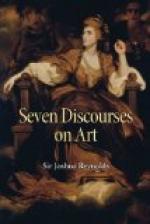Every seminary of learning may be said to be surrounded with an atmosphere of floating knowledge, where every mind may imbibe somewhat congenial to its own original conceptions. Knowledge, thus obtained, has always something more popular and useful than that which is forced upon the mind by private precepts or solitary meditation. Besides, it is generally found that a youth more easily receives instruction from the companions of his studies, whose minds are nearly on a level with his own, than from those who are much his superiors; and it is from his equals only that he catches the fire of emulation.
One advantage, I will venture to affirm, we shall have in our academy, which no other nation can boast. We shall have nothing to unlearn. To this praise the present race of artists have a just claim. As far as they have yet proceeded they are right. With us the exertions of genius will henceforward be directed to their proper objects. It will not be as it has been in other schools, where he that travelled fastest only wandered farthest from the right way.
Impressed as I am, therefore, with such a favourable opinion of my associates in this undertaking, it would ill become me to dictate to any of them. But as these institutions have so often failed in other nations, and as it is natural to think with regret how much might have been done, and how little has been done, I must take leave to offer a few hints, by which those errors may be rectified, and those defects supplied. These the professors and visitors may reject or adopt as they shall think proper.
I would chiefly recommend that an implicit obedience to the rules of art, as established by the great masters, should be exacted from the young students. That those models, which have passed through the approbation of ages, should be considered by them as perfect and infallible guides as subjects for their imitation, not their criticism.
I am confident that this is the only efficacious method of making a progress in the arts; and that he who sets out with doubting will find life finished before he becomes master of the rudiments. For it may be laid down as a maxim, that he who begins by presuming on his own sense has ended his studies as soon as he has commenced them. Every opportunity, therefore, should be taken to discountenance that false and vulgar opinion that rules are the fetters of genius. They are fetters only to men of no genius; as that armour, which upon the strong becomes an ornament and a defence, upon the weak and misshapen turns into a load, and cripples the body which it was made to protect.
How much liberty may be taken to break through those rules, and, as the poet expresses it,
“To snatch a grace beyond the reach of art,”
may be an after consideration, when the pupils become masters themselves. It is then, when their genius has received its utmost improvement, that rules may possibly be dispensed with. But let us not destroy the scaffold until we have raised the building.




